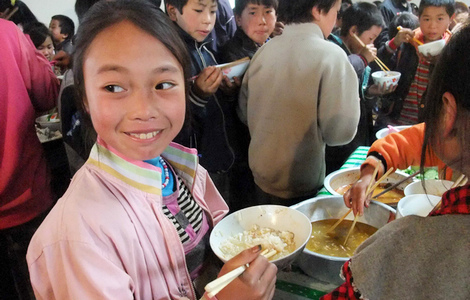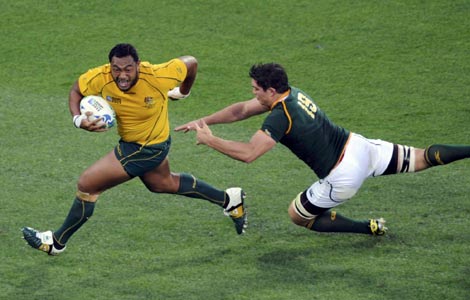Energy links with Russia strengthened
Updated: 2011-10-12 06:55
By Li Xiaokun and Ma Liyao (China Daily)
|
|||||||||||
|
![Premier Wen Jiabao greets Russian Prime Minister Vladimir Putin during a welcoming ceremony in Beijing on Oct 11, 2011. Flanking the two leaders are Vice-Premier Wang Qishan and his Russian counterpart Alexander Zhukov. [Wu Zhiyi / China Daily] Energy links with Russia strengthened](../../images/attachement/jpg/site1/20111012/0013729e48090fff0db901.jpg) |
|
Premier Wen Jiabao greets Russian Prime Minister Vladimir Putin during a welcoming ceremony in Beijing on Oct 11, 2011. Flanking the two leaders are Vice-Premier Wang Qishan and his Russian counterpart Alexander Zhukov. [Wu Zhiyi / China Daily] |
BEIJING - China and Russia made giant strides in energy cooperation on Tuesday by first agreeing a price for Russian oil exported through a cross-border pipeline and then announcing the approaching "final stage" of work on Russian gas exports to China.
Premier Wen Jiabao and his Russian counterpart Vladimir Putin announced the breakthroughs after co-chairing discussions at the Great Hall of the People.
"The two countries agreed on crude oil prices and decided to actively push forward cooperation on oil and gas," Wen said at a news conference after the talks which lasted for nearly three hours.
On Jan 1 Russia started to supply China with 300,000 barrels of oil daily via the first stage of the East Siberia-Pacific Ocean pipeline. But Russia said China had underpaid it tens of million of dollars due to a tariff dispute.
The agreement on oil prices was matched by progress on gas.
"As for gas supplies, we are nearing the final stage of work," Putin told reporters.
A deal to supply the world's second-biggest economy with up to 68 billion cubic meters of Russian gas annually over 30 years has been subject to delay due to pricing disagreements.
Russian gas giant Gazprom and China National Petroleum Corporation signed a framework agreement in 2009. However, Russia seeks around $300 per cubic meter, similar to what European customers pay.
But China wants a price under $200 per cubic meter, similar to what it pays for supplies from Central Asia.
Vice-Premier Wang Qishan and Russian Deputy Prime Minister Igor Sechin discussed energy issues in detail earlier on Tuesday as they co-chaired energy talks.
Yu Sui, a professor of Russian studies with the Beijing-based China Center for Contemporary World Studies, said that before China and Russia strike a balance they should refer to the international price, which has been falling recently.
The gap has been narrowed to $50 per cubic meter, as China raised its bid to $250.
Putin, on his first trip abroad since he announced his plan to run for the presidency, called for compromise.
"Those who sell always want to sell at a higher price, while those who buy, want to buy at a lower price. We need to reach a compromise which will satisfy both sides."
Wen said that the Chinese government is willing to strive, together with the Russians, to build a strategic partnership between the two countries.
Wen and Putin on Tuesday also witnessed the signing of nine documents, including a deal between Russian state bank VEB and the China Development Bank for the Chinese bank to invest $1.5 billion in building the first stage of a 750,000-ton aluminum smelter in Taishet in Russia's Irkutsk Oblast region. The China Investment Corp also agreed to invest $1 billion in a joint Russia-China investment fund set up in partnership with a Russian state-backed vehicle to promote direct investment.
China is now Russia's top trading partner, with trade volume this year expected to exceed $80 billion, according to Putin.
Aside from the huge economic interests, many commentators and observers also see the visit by Putin, accompanied by a 160-member delegation, as politically significant.
Bloomberg said that the trip indicates Putin is likely to lean more on Asia in his foreign policy and develop stronger ties with China if he returns to the presidency in 2012.
Indian newspaper The Hindu said on Tuesday that "Russia's new emphasis on technological cooperation with China creates both a challenge and opportunity for India.
"The modernization pact Putin is to sign in Beijing should give India a cue to follow in its relations with Russia," it said.
But Yu, from the research center, noted that other nations do not need to worry about closer cooperation between Beijing and Moscow as relations "benefit regional and world peace".
Guan Guihai, associate dean of the School of International Studies at Peking University, said Putin's visit "should be treated as nothing unusual under the mechanism of regular premier meetings".
Putin arrived in Beijing a day after Russia and China signed 16 economic and trade deals worth $7.1 billion, mainly in the new energy and mining sectors.
Zhang Yunbi, Xinhua, Reuters and AFP contributed to this story.
Related Stories
Russia, China working on new energy routes:Putin 2011-10-12 01:13
Russia to build 1st nuke power plant in Belarus 2011-10-11 22:39
China, Russia vow to deepen co-op in humanities 2011-10-11 14:29
China, Russia seek to expand economic ties 2011-10-10 19:21
China raises proposal on economic co-op with Russia 2011-10-11 06:23
Putin's visit to enhance China-Russia cooperation 2011-10-10 09:32
- US Senate passes yuan bill amid China's opposition
- China, Russia near deal on gas
- China, Vietnam focus on future ties
- China Red Cross changes leadership
- China, Vietnam sign maritime accord
- Chinese, Russian PMs pledge closer co-op
- Russia, China working on new energy routes
- Putin starts official visit to China
Hot Topics
Libya conflict, Gaddafi, Oil spill, Palace Museum scandal, Inflation, Japan's new PM, Trapped miners, Mooncake tax, Weekly photos, Hurricane Irene
Editor's Picks

|

|

|

|

|

|







